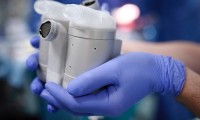-
Epigenetic Dysregulation May Be Key to Onset
- Source: Pixabay
- 801
- March 9, 2018
-
Exposure to smoke during pregnancy contributes to poorer lung function in children with asthma
- Source: msn
- 1,337
- March 8, 2018
-
New wearable may hold benefits for people with Parkinson’s
- Source: 3D Printing Progress
- 857
- March 7, 2018
-
Major Medical Associations Feud Over Diabetes Guidelines
- Source: NPR
- 761
- March 6, 2018
-
Ancon Medical Launches Human Trials in Search for Flu Biomarker
- Source: Cision
- 1,230
- March 5, 2018
-
Stem cell therapy offers hope for spinal cord injuries
- Source: pharmafile
- 716
- March 1, 2018
-
Scandinavian Real Heart selects AdaCore software for artificial heart
- Source: Verdict Medical Devices
- 842
- March 1, 2018
-
Carewave Medical raising cash for pain relieving wearable, with support from big biotech names
- Source: GeekWire
- 960
- February 28, 2018
your submission has already been received.
OK
Subscribe
Please enter a valid Email address!
Submit
The most relevant industry news & insight will be sent to you every two weeks.













